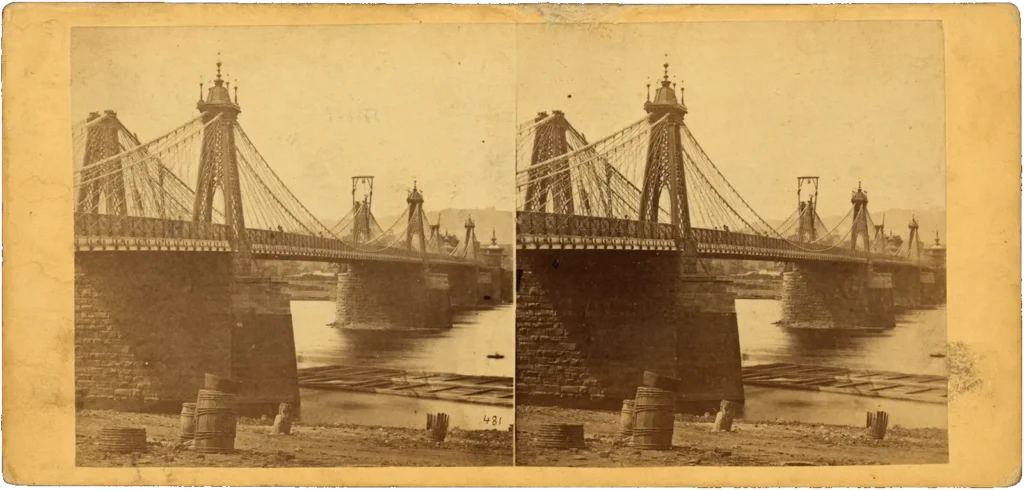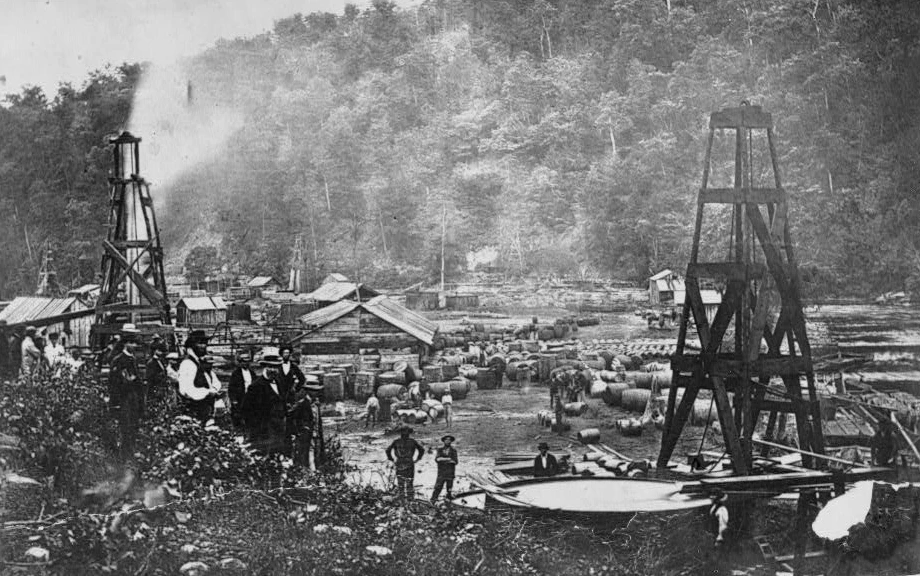Spring Freshet: Great Destruction of Property
The Pittsburgh Commercial, March 18, 1865

We are now in the midst of what promises to be the greatest and most disastrous freshet that has ever occurred in the Allegheny Valley since the memorable flood of 1832. The people residing in the immediate vicinity of the city lave been prepared for it, and their precautions will, therefore, save them the usual disasters resulting from a sudden rising of the waters. During the day, yesterday, the most painful rumors were afloat in the city relative to disasters by the flood in Oil City, Franklin, and other towns along the river. Houses with their residents were reported to be carried off from Oil City, and part of the town of Franklin swept away by the angry water.
The Allegheny River, at this city, commenced rising rapidly on Thursday morning, and continued to swell during the night and yesterday at the rate of about six inches per hour. At dusk last evening the water had risen to twenty-seven feet, and the lower portions of Allegheny were completely submerged. A large number of families were compelled to vacate their dwellings, while many others removed their effects to the upper stories, and bold communication with the mainland by means of skiffs and small rafts. The excitement was intense, and the abutments and footwalks of the St. Clair Street Suspension Bridge were crowded with people anxiously gazing upon the rising waters.
An immense amount of property has been destroyed, which is estimated by millions of dollars. The river was literally covered with oil barrels and lumber during the day and evening. Three frame dwelling houses floated down during the afternoon, one of them having a stove pipe protruding through the roof, from which the smoke was issuing. One of the houses was drawn by the current to the Allegheny side of the river and moored in safety near the island. A span of a bridge, about one hundred feet in length, passed down together with thousands of oil barrels; lumber which had apparently been piled in yards and carried from their foundations, remaining intact rafts, flats, derricks, saw logs, and everything that could possibly float away.
The piers of the upper bridges were piled with rafts and heavy timbers, much of which will be saved when the river recedes. A number of men in skiffs were busily engaged during the day in saving oil barrels and lumber, and, although the current was fearfully swift, their dangerous labors were rewarded with considerable success. Two flats, laden with coal, passed the piers of the bridges in safety, but were followed by these men, overhauled at Manchester, and brought to the shore. The persistent efforts of these skillful boatmen to recover the lost property attracted great attention from persons on the shore, who stimulated them to greater exertion by frequent demonstrations of approval.
The loss immediately around the city is confined principally to oil barrels, a large number of which were floated off. Workmen were engaged to a late hour last night in removing barrels from the wharf, and it required the utmost exertion, in many instances, to save them, owing to the rapid rise of the river. It Is impossible to estimate the damage which has been sustained, but it will be very heavy. Mr. Strickler, an oil dealer, lost 340 barrels, and the Lucesco Oil Works are also heavy losers. We did not learn the names of any others.
The lines of the various railroads centering in this city suffered severely from the flood. At Tipton, beyond Altoona, on the Pennsylvania Railroad, a bridge over a small stream was washed away, and delayed the trains for some hours. The damage, however, was repaired, and the trains commenced running as usual. The track of the Allegheny Valley Railroad was submerged between Freeport and Kittanning, and travel was suspended. We learn that the river along the line of this road was swollen to such an extent, in some, places, as to cover an extent of four or five miles. The Pittsburgh, Fort Wayne and Chicago Railroad was not incommoded by the high water, and their trains were run as usual.
About eight o’clock last evening the water burst from the mouths of the sewers on Federal Street, Allegheny, and in a short time the street from the Suspension Bridge to the Railroad Depot was covered to the depth of about a foot. At twelve o’clock the river had risen to thirty feet, and the water on Federal Street had, in some places, reached the depth of three feet, and communication between the two cities by that avenue was cut off. The cellars on both sides of St. Clair’s Street are filled with water, as are nearly all the buildings within a square of the river. It was supposed last night by well-informed river men that there would be at least six feet more water. Great fears were expressed for the safety of Mechanics’ Street Bridge, and a rumor was current that it had been swept away, but up to twelve o’clock last night it still maintained its position. From indications, the present freshet will equal if not surpass any previous flood which has occurred for many years.
The telegraph wires along the Ohio River were down last night, caused by the poles supporting them being washed away by the flood. The wires east also suffered from the same cause.
Concerning the destruction by the freshet elsewhere we have the subjoined dispatches:
Special Dispatch to Pittsburgh Commercial
Franklin, March 17
The river is six feet higher at this place than ever known before. The bridge across French Creek has been swept off. The lots are estimated at over one million dollars in this section The water is still rising. All land communication is cut off from here.
— W. W. W.
Special Dispatch to Pittsburgh Commercial
Franklin, March 17 — 6 p.m.
The river has risen since last night fourteen feet. Most of the bridges are swept away, and we have no communication with any place by rail. The whole of the lower part of Oil City is swept away. Houses, with their inmates, are floating on the river. It is impossible to estimate the loss and distress. The river is filled with everything pertaining to the oil trade. The railroad to Meadville cannot be repaired for several days. The Oil City Railroad is under the water. The damage is great. The oldest inhabitant says the river is higher than ever known before.
LATER — The river ceased rising at 8 o’clock p.m.
Another Dispatch
Franklin, March 17
This is the greatest freshet ever known in Oildom. There is complete destruction of everything. The Oil City Railroad is two feet under water. The bridge over French Creek is swept away. Yesterday the water was eight feet deep on Seneca Street, Oil City. Houses, derricks, tanks and oil barrels all started on a journey last evening. Loss estimated at over one million dollars. Report says it is almost a deluge. The people of Oil City have had to take refuge on the bills. Telegraph communication is destroyed between Franklin and Oil Valley.
FIVE O’CLOCK — The river is rising from four to six inches an hour, and thirty-five feet of water in the river.
Associated Press Dispatches
Franklin, March 17
We are having the greatest flood ever known in this region. The bridge at Oil City and the French Creek Bridge at Franklin were swept away. A mile of the railroad track is gone and the telegraph lines on Oil Creek are washed away. Houses, tanks, barrels (fall and empty), cover the river. The loss is estimated by the million. The river is still rising. The water in this vicinity is three feet higher than ever before.
Buffalo, March 17
The gas works are effectually stopped, and the fires are out, and no gas can be furnished to our citizens for days to come. The iron bridge across the river, built by the Attica and Buffalo Railroad Company, was carried away about one o’clock. Little Falls to the farthest point that has been reached today. There are about two miles of telegraph poles and wires down this side of Little Falls. The extent of damage east of that place is unknown.
Rochester, March 17
There is the greatest flood at Rochester that was ever known. The water in the river fills all the arches under the aqueduct and overflows the railroad bridge. It is several feet deep on Exchange Street, and flows across Buffalo Street near the Arcade, filling all the cellars and covering the ground floor of many of the principal stores. No trains have left the city eastward on the Central or Genesee Valley roads since yesterday at eight o’clock. The water is still rising, but as it has subsided in the river at Mount Morris it is hoped that no great damage will result.
